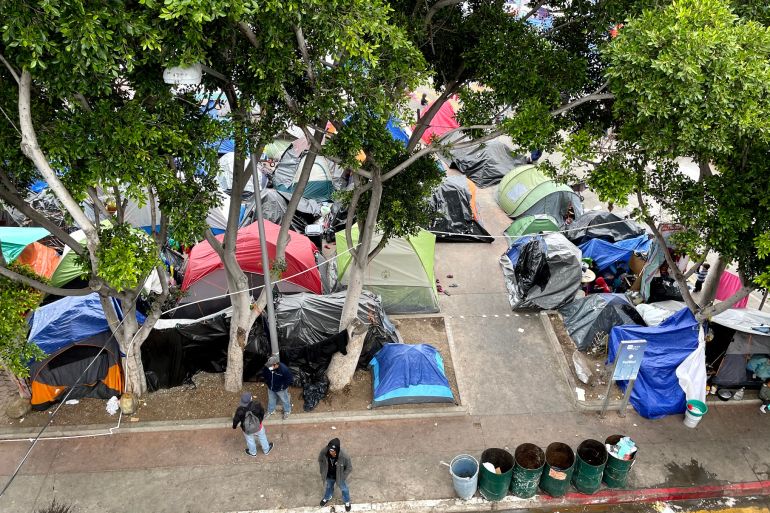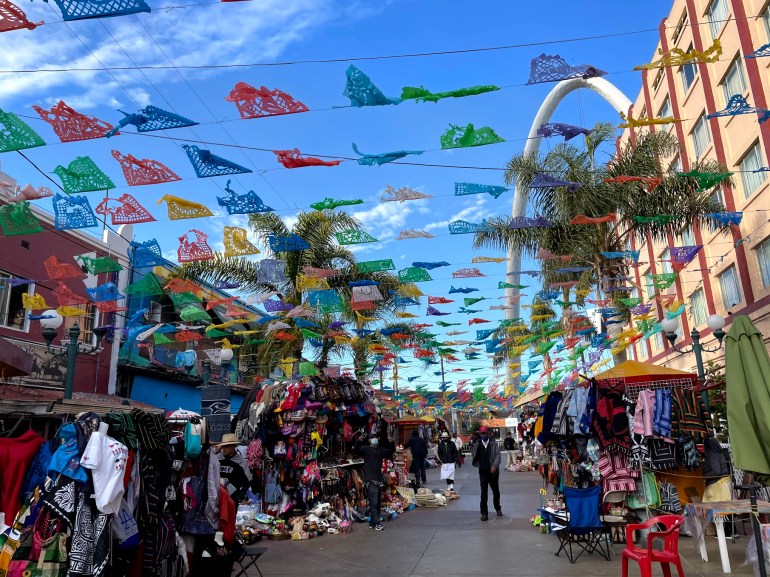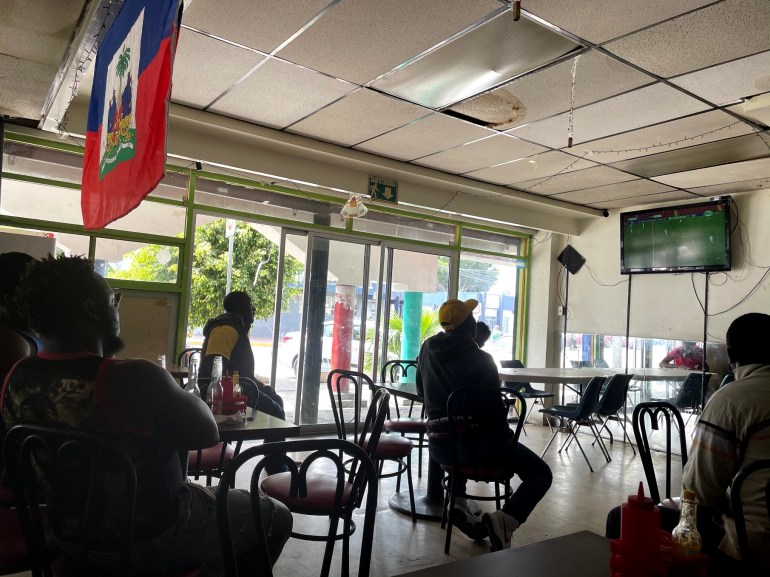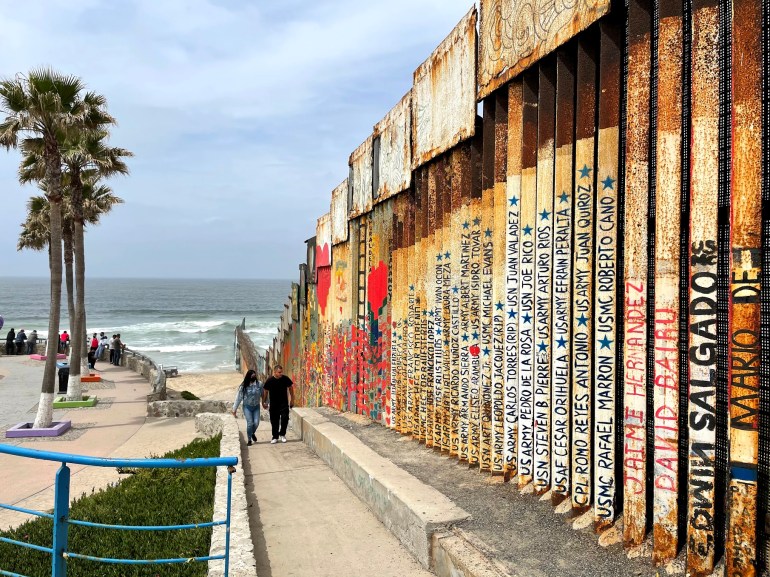‘I’m trapped here’: Haitian asylum seekers languish in Mexico
Unable to get US asylum and facing discrimination in Mexico, Haitians say they have nowhere to go and are losing hope.

Tijuana, Mexico – Each morning, Samuel* leaves the cramped, single-room apartment he shares with a dozen other Haitian asylum seekers in central Tijuana and wanders over to the makeshift migrant camp that he used to call home.
Until last month, he had lived peacefully at El Chaparral, a sprawling migrant tent city near the US-Mexico border wall, alongside Haitians and asylum seekers from other countries, all waiting to try to get into the United States.
Keep reading
list of 4 itemsWhat is happening in Haiti, where political crisis persists?
Can Biden change US attitudes towards migrants and immigration?
‘I don’t feel safe’: Migrants face attacks, threats in Mexico
But Samuel says the atmosphere gradually shifted to one of hostility.
“That’s where I used to live,” he told Al Jazeera, pointing to a spot among the wrinkled patchwork of white and blue tents that house more than 1,000 people. “Life here became too hard, and the racism from other [residents] was terrible. I felt that I needed to leave.”
As thousands of asylum seekers have streamed northward to the US-Mexico border in recent months in hopes of entering the US, Haitians say they are facing a second layer of agony: anti-Black racism from police and other migrants in Mexico.

Haitian asylum seekers were the majority in El Chapparal in mid-2020, but as thousands of other migrants reached Tijuana and took shelter in the camp, the last Haitian holdouts abandoned the informal settlement.
Haitians say other asylum seekers hurled racist vitriol at them, creating an atmosphere that pushed Samuel and others to leave and take refuge in squalid apartments or shelters on the outskirts of the city instead.
“The discrimination is very strong from other migrants, but even from Mexican organisations working in the camp,” said Arold*, a Haitian activist who has been documenting abuses against the community in Tijuana and delivers food and other aid to Haitian asylum seekers.
“Nobody wanted to share the food being distributed with them [the Haitian camp residents],” he said, adding that he also received reports that an informal school run by residents also stopped Haitian children from attending classes.
Arold, 32, who came to Tijuana four years ago with hopes of gaining asylum, said he lives in fear of retaliation from police or local armed groups. Like many other Haitians who spoke with Al Jazeera, he requested anonymity in fear of retribution for speaking out.
Crisis in Haiti
A pandemic-linked economic collapse across much of Latin America, an explosion of gang violence, and hopes for gentler asylum policies from the nascent Biden administration have combined to trigger a surge in migration towards the US.
In March alone, US immigration authorities apprehended more than 172,000 people attempting to cross from Mexico, while a bottleneck of migrants and asylum seekers from dozens of countries continues to balloon in border cities like Tijuana. An estimated 4,000 Haitian migrants currently live in Tijuana, according to local activists and media reports.
But the exodus of Haitians stretches back to 2010, when the capital, Port-au-Prince, was flattened in a devastating earthquake. The disaster left at least 220,000 dead and 1.5 million homeless, and triggered a massive wave of emigration.
Most were bound for Brazil, where the authorities initially granted Haitians work visas and contracted thousands to work on infrastructure projects for the 2014 World Cup and 2016 Rio Olympic Games. But many lost their livelihoods when those projects ended, and beginning in 2016, tens of thousands of Haitians journeyed on foot to try to seek asylum in the US.
By the end of that year, at least 40,000 Haitians had arrived in Tijuana, but virtually all were refused entry into the US at the border.
US border shut
Earlier this year, many Haitian migrants had hoped US President Joe Biden would adopt more compassionate border policies, but the US border effectively remains sealed to most migrant adults and families.
Under Title 42, a public health law invoked by the US government last year due to the COVID-19 pandemic, the country partially closed its borders and dramatically restricted access for asylum seekers. Despite promises from the Biden administration to allow more asylum seekers allowed to enter, advocates say about 1,200 Haitians have been deported in the last few months.
“Since Biden took office, they have sent 28 expulsion flights back to Haiti,” said Guerline Jozef, president of Haitian Bridge Alliance, a humanitarian group in San Diego that assists Haitian migrants on both sides of the border.
While US authorities last year struck a deal with Mexico to deport citizens of several Central American countries, Haitians are not covered under the agreement. The Department of Homeland Security has used Title 42 to continue to expel migrants directly to Haiti, despite a US travel advisory to the country and growing political unrest.
“How do they justify the way they are treating Black migrants?” Jozef asked. “On these flights, we have pregnant women, we have infants who are one month old, we have children who are traumatised.”

‘Nowhere to move forward’
Meanwhile, thousands of Haitians remain in Tijuana, either waiting to try to get into the US, or attempting to build a life on the Mexican side of the border. Stephanie*, who fled Haiti in 2014 with her two young children, is in the latter group.
Following the destruction of her entire Port-au-Prince neighbourhood in the 2010 earthquake and a subsequent series of cholera outbreaks, she put what little savings she had towards an escape by boat to South America.
“Port-au-Prince wasn’t a city any more when I left,” she told Al Jazeera. “Just a mountain of garbage – that’s what we climbed out of.”
After struggling in Brazil, she left her children with friends and begin a four-month journey by foot to Tijuana, hoping to eventually gain asylum in the US. She said she was kidnapped and robbed by gunmen along the way, and spent an entire month lost with other Haitian travellers in the jungle of Panama.
Arriving in Mexico in 2018, the authorities detained her for two months for illegal entry. A typo on the identification document she was later granted means she is still considered illegal, however, and cannot obtain medical care.
Many of her friends have left to cross the border in recent months, but she said she has given up on dreams of gaining asylum in the US. She speaks frequently by phone with her children in Brazil, but she fears for their safety, too.
“I don’t know what to do, or how to see my babies again,” said Stephanie, who lives in a room with a dozen other people and ekes out a living by cooking at a Haitian restaurant. “I can’t go back, but there’s nowhere to move forward. I’m just trapped here.”
Losing hope
Tijuana police authorities did not respond to multiple requests for comment from Al Jazeera about Stephanie’s case, and other allegations of police discrimination against Haitians in the city.
Last summer, anti-racism protests erupted around El Chaparral, spurred in part by the alleged murder of a Haitian man at the hands of local police officers, and what activists say is a wave of arbitrary detention targeting the Black community.
But not much has changed, Haitian asylum seekers say, and with each passing day, more are losing hope of reaching the US.
Edile Eglaus said he also feels trapped in Tijuana, where he, his wife and their two children live in crushing poverty in a migrant shelter on the city’s outskirts, surviving off care packages delivered by charities.

He said his family was robbed and lost all their documents during their long journey to Mexico. But Eglaus said gang members recently murdered his cousin in Haiti, so going back now is out of the question.
“My family had nothing in Haiti, no house, no food, no money,” Eglaus said. “No matter what, returning to that is impossible.”
*Names changed to protect identities amid fears of retribution